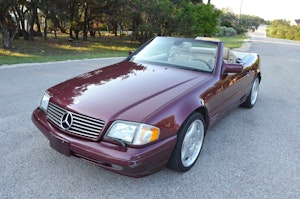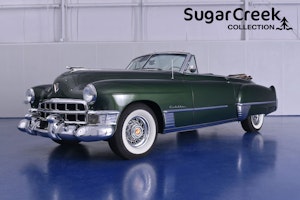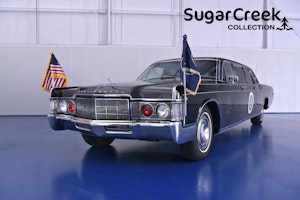Media | Articles
It’s not paranoia if they really are out to take your cars
I’ve been thinking a lot about Neil Peart and Richard Aborn these past few weeks. Chances are you know who Neil Peart was—if you don’t, that might indicate that our campaign to attract more female automotive enthusiasts to this page is working, because I’ve never met a woman who could name a single member of Rush or name a single song the band played. Most of us dudes at least know their six-minute tune Red Barchetta and its dire prediction of a country in the grip of “the Motor Law,” where the mere operation of an internal-combustion vehicle is a crime. Neil recently lost his struggle with cancer, a loss felt deeply by many Hagerty readers.
I’d be willing to bet that very few of you know who Richard Aborn is. He was the president of Handgun Control, Inc., in 1993 when the Brady Bill was passed. Prior to the bill’s passage, the NRA and others said that it would be the “camel’s nose under the tent” of firearms legislation. This is a reference to an old saying that you can’t just let the camel’s nose into a tent—you end up letting the whole camel in, whether you want to or not.
Anyway, when the Brady Bill was passed, Mr. Aborn grabbed a reporter and said, “[The bill’s detractors were] right all along in fearing the waiting period was a camel’s nose under the tent. Brady has now passed and it is time to reveal the rest of the camel!” At the time, I thought that was a little, ahem, bold of the man to say. Regardless of how you feel about gun control, you can probably agree with me that you shouldn’t spike the football before the referee puts his hands up. But Mr. Aborn no doubt figured he was on the right side of history in this matter.
Across the Atlantic, the legislators both elected and unelected believe themselves to be on the right side of history when it comes to the privately-owned internal-combustion vehicle—more specifically, when it comes to the demise of same. The UK just announced that it would ban the sale of gas or diesel cars by 2035, “or earlier, if possible.” When Neil Peart wrote Red Barchetta, that date was a robust 60 years away. Now it’s closer in our windshield than the introduction of the second-generation Toyota Prius is in our rearview mirror, so to speak.
This astounding regulatory decision, made by people who can’t gauge the UK’s relative impact on the climate vis-a-vis China—or maybe they just read 1984 as an instruction manual, not a warning—sickens me. There’s only one thing to be said in its defense: at least it’s kind of fair. Contrast it to the Europeans, who are doing something even nastier: their 2021 emissions standards require a fleet average of 58 mpg or thereabouts. You couldn’t do that with an all-Prius fleet. Heck, not even the Plymouth Horizon Miser could hit that mark.
Marketplace
Buy and sell classics with confidence
What the EU expects the automakers to do is simple: continue making Ferraris, AMG Benzes, and whatnot for the super-rich while forcing everyone else into an electric vehicle. So while British showrooms will force the same misery on everyone, kind of like the way everyone in London had to hide in the same shelters during the Blitz, the Europeans will make sure that the most privileged among us get to keep doing what they want while the average man or woman in the street gets stuck with a glorified golf cart.
(If you like, and if it fits your political worldview, you’re also free to see this as a way to make the dirty plutocrats subsidize clean electric transportation for the proletariat through extra markup on their G-wagens or Range Rovers or whatever. There’s room for all views here, except perhaps for those held by the people who weld enormous scrap-sheet metal fenders on old 911s for no reason.)
The delight with which the politicians are rolling out these regulations would make Richard Aborn blush. If you didn’t happen to know the actual facts and figures on automotive CO2 emissions, and if you didn’t happen to know the actual facts on how these figures compare to things like bovine flatulence and cruise-ship usage, you’d be forgiven for thinking that we’d figured out a way to beat global warming or whatever like Mike Tyson used to beat his hapless opponents in the first round.
I know some very practical-minded Englishmen who say that all of this amounts to nothing but hard negotiating, the same way that Richard Aborn probably didn’t think he was going to get his whole legislative agenda passed immediately. “The charging and transmission infrastructure won’t be there,” my friends say, “so this will all come to naught.” Other people have pointed out that the voters might wish to have a say on this matter, although it’s hard to know how much say they can have when both parties in the UK use utterly identical climate-change rhetoric and the EU mandarins are selected rather than elected.
Even if my friends are correct, these caveats strike me as being a lot like saying, “Well, sure, there’s a man in the house with an axe who says he’s going to kill you and your family, but the axe is pretty dull and the fellow in question doesn’t have much practical chopping experience.” When you get to the point where you’re hoping for some kind of technical or legislative deus ex machina to save you from a clearly defined and described fate, that’s a sign you’ve lost the battle.
I’ve also heard that we shouldn’t take all this too seriously because it will still be possible to buy and sell more than a hundred years’ worth of outstanding internal-combustion cars. To which I can only reply: Don’t bet on that being the case for long. The minute that the man in the street can’t buy a new gas-powered car for his family, his willingness to tolerate your AC Cobra or Corvette Stingray or Oldsmobile Silhouette will wither like spring wheat in a late frost. If you want further incentive on this point, consider the fact that the uncle in Red Barchetta was probably distilling his own gasoline because all the stations had long since closed. Our hobby cannot long survive in a world where only the fervently committed own real cars. Maybe it will be illegal to have a gas-powered car if your neighbors don’t like it—or maybe it might be like the possession of LSD, which isn’t legal now even if you made or purchased said LSD legally in 1965.
In other words, these transatlantic developments should legitimately frighten all of us, no matter whether our home track is Sebring or Snetterton or Sepang. For me, however, there’s one redeeming aspect to them: We are now seeing the rest of the camel. Any pretense of “reasonable car control” or “common-sense vehicle legislation” is now gone with the wind. The governments are speaking, and they are saying that the vast majority of their citizens should no longer have the choice of purchasing a new internal-combustion vehicle. As a legendary space smuggler once said in a movie:
Bring ’em on, I’d prefer a straight fight to all this sneaking around.
We’re going to get a straight fight now, both overseas and, most likely, in the United States. I’d like to think that most of us will be on the side of automotive freedom. At the very least, consider it a clarion call to buy, drive, and enjoy the car of your dreams now, rather than later. You might not always have the chance. And now you know what’s at stake in the battle to save driving for generations to come. How’s the old saying go? Oh yes: It’s not paranoia if they really are after you.










